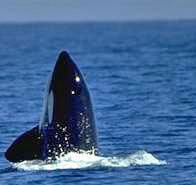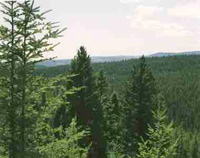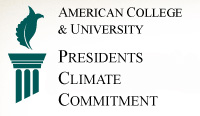
News |
- First Nation Values at Rivers Conference
- Tool for NWT Impacts Released
- Business Climate Change Platform Launched
- CITES Upholds Commercial Whaling Ban
- Boreal Protection Needed in Climate Plans
- Catalog Campaign Reforms Industry
- Books Chronicle Change Movements
- Report Reveals Dramatic Bird Population Decline
- US Colleges Climate Change Pledge
- Rolling Stone Uses 'Carbon Neutral' Paper
- Clean Environment Commission Appointees
- Manitoba Joins Western/US Climate Initiative
| First Nation Values at Rivers Conference | 20 July 07 |
 Bloodvein River First Nation presented its perspectives on the Bloodvein Heritage River at a recent national conference held in Winnipeg June 10 - 14, 2007.
Bloodvein River First Nation presented its perspectives on the Bloodvein Heritage River at a recent national conference held in Winnipeg June 10 - 14, 2007.The community's presentation focused on the significant role the Bloodvein River has played in sustaining First Nation peoples for many generations. The river has functioned as a travel route, brought the community trade, sustenance and news, while acting as a connection to the rest of the world. Bloodvein River First Nation stated its intention to participate in the 2010 Bloodvein Heritage River monitoring report and advocates for inclusion of traditional ecological as part of monitoring criteria. It will also be working towards co-management of the traditional lands within Atikaki Park, which the Heritage River flows through. The First Nation envisions a future for the river where its Aboriginal values, uses, and rights are acknowledged and protected as part of the management and protection of the river. The Current Perspectives, the 5th Canadian Heritage Rivers Conference coincided with Canadian Rivers Day June 10th and explored ways in which communities are implementing environmentally sustainable management practices with respect to heritage rivers. View Bloodvein River First Nation's June 12, 2007 presentation to the 5th Canadian Heritage Rivers Conference (PDF) Visit the Rivers West webpage for the conference, Current Perspectives, the 5th Canadian Heritage Rivers Conference Visit the Canadian Heritage Rivers System webpage for the Bloodvein River Source: Bloodvein River First Nation, Rivers West
|
|
| Tool for NWT Impacts Released | 16 July 07 |
 The Canadian Arctic Resources Committee has just released a tool that represents a major step in showing cumulative impacts. The computer-based tool uses satellite imagery and publicly available information to map the increasing impacts of development in the Northwest Territories.
The Canadian Arctic Resources Committee has just released a tool that represents a major step in showing cumulative impacts. The computer-based tool uses satellite imagery and publicly available information to map the increasing impacts of development in the Northwest Territories. The mapping tool uses "Google Earth" to show the zones of impact caused by each type of development. These impacts are separated out into high, medium and low impact zones. In the highest impact zones, all forms of plant and wildlife are affected. Use of the mapping tool will show the effects that may result from adding more development to the northern landscape and hopefully will improve decision-making. View June 24, 2007 Canadian Arctic Resources Committee press release View the June 2007 Canadian Arctic Resources Committee report, Meta-Cumulative Effects: Mapping Cumulative Impacts of resources Extraction and Development Throughout the NWT (PDF) View the Google Earth mapping tool file Source: Canadian Arctic Resources Committee
|
|
| Business Climate Change Platform Launched | 16 July 07 |
 The Global Compact, in association with the World Business Council for Sustainable Development (WBCSD) and the United Nations Environment Programme (UNEP), recently launched the Global Business Leadership Platform on Climate Change.
The Global Compact, in association with the World Business Council for Sustainable Development (WBCSD) and the United Nations Environment Programme (UNEP), recently launched the Global Business Leadership Platform on Climate Change.The Statement, "Caring for Climate: The Business Leadership Platform", is an expression of the urgent need for all businesses, governments and citizens to take steps to address climate change and offers businesses an opportunity to demonstrate climate leadership on both the individual and collective levels. The statement was released in advance of the Global Compact Leaders Summit, 5-6 July 2007 in Geneva, an invitation-only event designed for chief executives, "C-suite" officers, board members and presidents of country or regional subsidiaries. Under the umbrella of the United Nations, the summit focused on the business sustainability agenda. Visit Global Compact Leaders Summit website Visit United Nations Global Compact web page on the Global Business Leadership Platform on Climate Change View "Caring for Climate: The Business Leadership Platform" statement (PDF) View a Statement by the Business Leaders of the UN Global Compact Source: United Nations Global Compact
|
|
| CITES Upholds Commercial Whaling Ban | 16 July 07 |
 The Convention on International Trade in Endangered Species (CITES) meeting on June 15, 2007 once more turned back attempts by Japan, Iceland and pro-whaling allies to lift restrictions on international commercial trade in whale products. The decisions were a blow to pro-whaling countries' strategy to seek a re-introduction of commercial whale hunting.
The Convention on International Trade in Endangered Species (CITES) meeting on June 15, 2007 once more turned back attempts by Japan, Iceland and pro-whaling allies to lift restrictions on international commercial trade in whale products. The decisions were a blow to pro-whaling countries' strategy to seek a re-introduction of commercial whale hunting.The International Whaling Commission's (IWC) ongoing global moratorium on commercial hunting means that international trade in whalemeat is banned. With no sign of the IWC 21-year moratorium being lifted, countries such as Japan view CITES as another route to opening the whale trade. CITES' Animals Committee voted down Japan's request for a full review of the population status of 13 great whale. Iceland also put forward a proposal asking for a review of the central North Atlantic fin whale based on its belief this population has recovered sufficiently to withstand limited hunting. CITES supported an Australian amendment to Iceland's proposal, which called for the committee to not conduct any review of large whales until the commercial ban is lifted. In demonstrating respect for the IWC ban, these decisions were also a victory for the relationship between IWC and CITES, as CITES has historically followed the advice of the International Whaling Commission (IWC) on whale stocks. View June 6, 2007 BBC News article View June 8, 2007 Science Now Daily article View June 15, 2007 Environmental News Service article View June 15, 2007 Whale and Dolphin Conservation Society press release Source: BBC News, Science Now Daily, Environmental News Service
|
|
| Boreal Protection Needed in Climate Plans | 11 July 07 |
 Two recent polls show that nine out of ten Ontarians are in favour of protecting more of Ontario's Boreal forest as a defense against global warming.
Two recent polls show that nine out of ten Ontarians are in favour of protecting more of Ontario's Boreal forest as a defense against global warming.CPAWS Wildlands League and ForestEthics each commissioned polls conducted in April and June 2007, which reinforce the assertion that "Ontarians want the Boreal Forest protected as part of responses to global warming" according to Tzeporah Berman, Strategic Director at ForestEthics. "Unfortunately, only ten per cent of Ontario's Boreal is under protection and not a single acre has been protected in the last four years." The Ontario government's long-awaited climate plan was released June 18th and did not include any measures for forest protection. Ontario is home to some of the largest intact forest on the planet; forest that if cut down would worsen the climate change situation the planet faces. Each year logging in Ontario emits roughly the same amount of greenhouse gas as all light duty trucks on the road in the province. Other findings from the polls:
View June 27, 2007 ForestEthics press release Source: CPAWS, ForestEthics
|
|
| Catalog Campaign Reforms Industry | 11 July 07 |
 ForestEthics' campaign to reform the devastating environmental practices of the catalog industry kicked off June 20th, 2007 with activists demonstrating at the J. Crew store in Manhattan. 'Candace the Caribou' was there representing one of the many species being driven out of North America's Boreal Forest as the catalog industry's endless demand for paper contributes to forest destruction, as well as global warming.
ForestEthics' campaign to reform the devastating environmental practices of the catalog industry kicked off June 20th, 2007 with activists demonstrating at the J. Crew store in Manhattan. 'Candace the Caribou' was there representing one of the many species being driven out of North America's Boreal Forest as the catalog industry's endless demand for paper contributes to forest destruction, as well as global warming.Catalog retailers send out 20 billion catalogs a year, and almost none of the paper contains recycled content. Over 8 million tons of trees a year go into catalogs alone. With response rate to their catalogs at less than 3 percent, the result is a staggering amount of environmental destruction for minimal returns. "Companies like Dell, Williams-Sonoma and Victoria's Secret have all announced major forest protection policies and practices for their catalogs," said Ginger Cassady of ForestEthics. "The rest of the catalog industry can no longer pretend this is not an issue." Candace the Caribou's tours across the US in the coming months, including protests at Sears/Lands' End, JCPenney, Eddie Bauer, and Crate & Barrel. ForestEthics is asking all of the companies on the tour, as well as the rest of the industry, to stop sourcing from Boreal Endangered Forests, increase post-consumer recycled content, reduce overall paper use, and introduce sustainable logging practices for catalog production. View June 20, 2007 ForestEthics press release View June 20, 2007 ForestEthics press release on EarthTimes.org View June 23, 2007 ForestEthics press release Source: Forest Ethics
|
|
| Books Chronicle Change Movements | 11 July 07 |
 Two new books chronicle the history, ideas and strategies of environmental and social activism in North America.
Two new books chronicle the history, ideas and strategies of environmental and social activism in North America.For over half a century, biologist Barry Commoner has been one of the most prominent and charismatic defenders of the American environment. Since the 1960s, he has called attention to parallels between the environmental, civil rights, labor, and peace movements, and connected environmental decline with poverty, injustice, exploitation, and war. He argues that the root cause of environmental problems is the American economic system. Michael Egan's biography examines Commoner's social and scientific activism and charts an important shift in American environmental values . Paul Hawken has spent over a decade researching organizations dedicated to restoring the environment and fostering social justice. His book, Blessed Unrest, explores the diversity of the environmental movement, its brilliant ideas, innovative strategies, and hidden history, which date back many centuries. According to Hawken, these groups collectively comprise the largest movement on earth, and yet the movement has gone largely ignored by politicians and the media. Hawken is also co-author of Natural Capital. View June 19, 2007 New York Times article on CommonDreams.org View information on Barry Commoner and the Science of Survival - The Remaking of American Environmentalism by Michael Egan from MIT Press View website for Blessed Unrest by Paul Hawken View May 23, 2007 interview with Paul Hawken on Democracy Now! View June 26, 2007 AlterNet article Source: New York Times, Democracy Now!, AlterNet
|
|
| Report Reveals Dramatic Bird Population Decline | 03 July 07 |
 A new analysis by the US National Audubon Society reveals populations of some of America's most familiar and beloved birds have dramatically declined over the past forty years, with some down as much as 80%. Canada is cited as a co-victim and co-culprit in the losses, but the report also says Canada's vast wilderness will be key to most of the species' recoveries.
A new analysis by the US National Audubon Society reveals populations of some of America's most familiar and beloved birds have dramatically declined over the past forty years, with some down as much as 80%. Canada is cited as a co-victim and co-culprit in the losses, but the report also says Canada's vast wilderness will be key to most of the species' recoveries.Along with habitat destruction throughout the U.S., researchers say logging and other incursions in Canada's boreal forest, melting Arctic permafrost, loss of Prairie grasslands and wetlands in many provinces, plus invasion of the Great Lakes region by alien species are key factors in bird-count freefall. "These are not rare or exotic birds we're talking about - these are the birds that visit our feeders and congregate at nearby lakes and seashores, and yet they are disappearing day by day," Audubon chairwoman Carol Browner said. The report frequently identifies, as crucial to reviving and protecting populations of the listed species, preservation of breeding and feeding grounds in Canada's boreal forest. View June 14, 2007 National Audubon Society press release View June 15, 2007 Chicago Tribune article View June 18, 2007 Ottawa Citizen article on Boreal Songbird Initiative website View June 14, 2007 National Audubon Society technical report, Combining Data from the Christmas Bird Count and the Breeding Bird Survey to Determine the Continental Status and Trends of North America Birds (PDF) Source: National Audubon Society, Ottawa Citizen
|
|
| US Colleges Climate Change Pledge | 03 July 07 |
 Presidents and chancellors in colleges and universities across the US are signing a pact to combat global warming by making their campuses "carbon neutral" as soon as possible.
Presidents and chancellors in colleges and universities across the US are signing a pact to combat global warming by making their campuses "carbon neutral" as soon as possible.Modeled after U.S. Mayors Climate Protection Agreement, the American College & University Presidents Climate Commitment has a goal of driving environmental change through research, education and reduced emissions. There are currently 312 signatories to the Commitment, which obliges institutions to:
The largest institution on the list of signatories is the University of California, with 10 campuses. Absent from the list are some of the wealthiest universities in the US, including Harvard, Stanford, Princeton and Yale. Organizers say they hope to enlist 1,000 institutions by 2009. View June 13, 2007 Los Angeles Times article View June 12, 2007 Washington Post article View text of American College and University Presidents Climate Commitment Source: National Audubon Society, Ottawa Citizen
|
|
| Rolling Stone Uses 'Carbon Neutral' Paper | 03 July 07 |
 The June 28th, 2007 issue of Rolling Stone magazine is not only all about global warming; it is printed on 'carbon neutral paper'. The June 28th, 2007 issue of Rolling Stone magazine is not only all about global warming; it is printed on 'carbon neutral paper'. The inaugural climate-friendly issue includes an interview with Al Gore and an in-depth report on global warming solutions by environmental advocate Robert F. Kennedy Jr; a special report on the Bush administration's climate change policy record; and interviews with organizers of next month's highly anticipated Live Earth concerts and the top artists performing. And from now on, Rolling Stone will be printed on Catalyst Cooled paper, produced through a process that results in net-zero CO2 emissions. Rolling Stone proudly proclaims it is the first mass-marketed magazine to print on carbon neutral paper. Environmental advocates have pointed out that although it is taking a positive step in choosing to print on 'carbon neutral' paper, Rolling Stone is not printing its magazine on recycled paper. View the the June 11, 2007 Catalyst Paper press release View the the June 12, 2007 Global Cool article View the the June 14, 2007 Globe and Mail article Sources: Catalyst Paper, Global cool, Globe and Mail
|
|
| Clean Environment Commission Appointees | 03 July 07 |
 Manitoba's Clean Environment Commission (CEC) welcomed two new Commissioners, appointed by the Conservation Minister April 4, 2007.
Manitoba's Clean Environment Commission (CEC) welcomed two new Commissioners, appointed by the Conservation Minister April 4, 2007.Norm Brandson is a Professional Engineer in Civil and Water Resource engineering. He was Deputy Minister for the Departments of Environment, Conservation and Water Stewardship during his 32-year career as a civil servant. He is a practicing consultant on resource and environment issues, and continues as a board member for Fort Whyte Alive, and his voluntary work on Lake Winnipeg issues. Aurelie Mogan is an economist with 25 years experience in social and economic analysis. She has 15 years of experience in agriculture issues and rural policy with Canada, and has been involved in research project partnerships between levels of government, and multiple sectors of the economy and society. She is currently Head of Research and Analysis for the Rural Secretariat, Government of Canada. View the Clean Environment Commission press release View information about the members of the CEC Source: Clean Environment Commission
|
|
| Manitoba Joins Western/US Climate Initiative | 27 June 07 |
 Manitoba joined six western U.S. states and British Columbia June 12, 2007 as a member of the Western Regional Climate Action Initiative (WRCAI).
Manitoba joined six western U.S. states and British Columbia June 12, 2007 as a member of the Western Regional Climate Action Initiative (WRCAI).The WRCI began late February 2007 with signing of an agreement by the Governors of Arizona, California, New Mexico, Oregon, and Washington to establish greenhouse gas reduction goal and develop market-based strategies to achieve the goal. British Columbia joined April 2007 and Utah joined in May. Wyoming and Colorado are participating as official observers while they continue to develop their state policies and initiatives. WRCAI aims to identify, evaluate and implement ways to collectively reduce greenhouse gas emissions in the region and to achieve related co-benefits. All participants in the WRCAI are also members of The Climate Registry, a new cross-border greenhouse gas registry launched in May 2007 with 34 state, 2 provincial, and 3 tribal members. View June 12, 2007 Government of Manitoba press release View the Western Regional Climate Action Initiative Agreement (PDF) Visit Manitoba Wildlands' Manitoba Climate Change Initiatives page Visit The Climate Registry Source: Government of Manitoba
|
|


 RSS Feeds:
RSS Feeds: